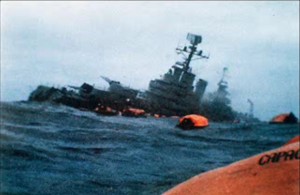WAS THE WAR DESIGNED to stave off cuts from the Navy?
Maybe listen again to Clive ponting in audio Archive
Clive Ponting told the Enquiry:
“Now in 1982 John Nott was still secretary of State but was in great disfavour with the Royal Navy because the year before he’d presided over a defence review that had virtually in the Navy’s view seen the end of Britain’s ocean going navy. The main aircraft carrier Invincible was to be sold to the Australians, all the major landing craft with the amphibious capability were to be scrapped, the number of frigates and ships were to be severely reduced. Now the Navy never accepted this policy, they were forced to go along with it, and all the time were attempting to get it reversed. I think the important point is that about April/May 1982 was the time at which final decisions would be taken, the ships would actually be sold or sent off to the breaker’s yard.” UW 50
“Now the military were quite determined that the operation was not going to be controlled from the Ministry of Defense headquarters in Whitehall … they decided very early on that the operation was to be controlled by the Commander-in-Chief Fleet at Northwood, one remove from London, and that all communications would be through the Chiefs of Staff… So really you’ve got a very complicated picture and it turned out that during the whole operation the main blockage of information was not between Falklands Islands and Northwood, but between Northwood and London. On many occasions I recall seeing John Nott’s Private Secretary and he would be absolutely fuming and so would John Nott; they could not find out what was going on in the South Atlantic!.. Only when they motored up to Northwood would they find the complete operations picture up on the board with every ship plotted exactly where it was.… So the information flow was from the South Atlantic to Northwood, then Northwood to the Chiefs of Staff, and then from the Chiefs of Staff to ministers.” (UW51-2)
On 7th April 1982 the Opposition spokesman complained, ‘We have a right to know the expedition’s objectives and we have not been told.’ Was a war the aim? Pym, Britain’s new Foreign Secretary, did not see it that way, nor did Al Haig the American Secretary of State: at every stage the British operation depended upon US assistance, and America really did not want a war between two of its allies. It hoped for – and still does want today – a negotiated settlement. Elected members of the Prime Minster’s Cabinet were not consulted, over the five weeks from 2nd April to 5th May.
Outside Chequers (May 2nd)
Admiral Lewin Chief of Defence Staff arrived at Chequers shortly before lunch, and ‘in what is admitted by all politicians present at the time to have been a meeting that lasted no more than 15 minutes on the doorstep of Chequers, he obtained authority from the war Cabinet to attack all Argentine warships anywhere on the high seas. Now this is absolutely crucial it seems to me when we are talking about political control of the military… Ministers have said since that they didn’t know which way the Belgrano was sailing. Maybe they should have asked. What sort of decision were they really taking, not even knowing where the ship was, which way it was going and what the threat to the task force was? CP55.
The ‘War cabinet’ here renounces its control over the war, without consulting its subcommittee of Mandarins, by telling the military that they could sink anything – allegedly doing so in ignorance (a) that the Argentine fleet had been sailing home-wards since dawn, and (b) that plans for an acceptable peace proposal had been hammered out that weekend in Peru, concordant with the mission of Francis Pym in New York and Washington. We are further asked to believe that none of the radio communication of the Argentine fleet had been received at GCHQ in Cheltenham. Whereas, as Paul Rogers told the Foreign Affairs Committee, ‘abundant circumstantial evidence now exists, from London, Washington and Lima,’ (FAC 139) that the War Cabinet was well aware of the diplomatic developments prior to the sinking; he further suggested that Thatcher was up at Naval Headquarters at Northwoods that afternoon’ (FAC p.138, Times 24 Sept 1984).


How on earth can a war that Britain did not start be said to have been “designed to” do anything by the Royal Navy? Specious nonsense.